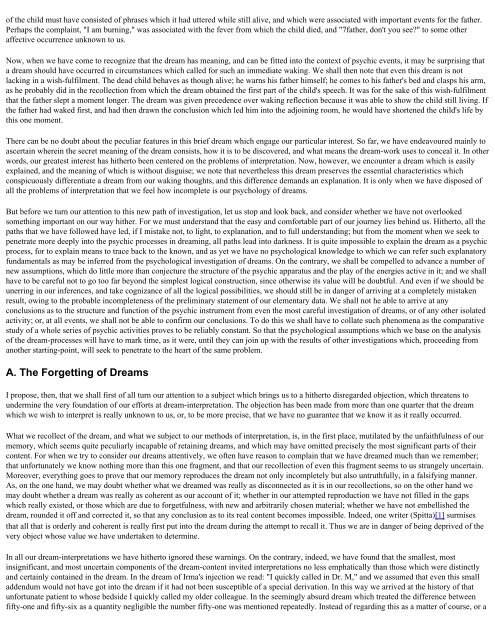The Interpretation of Dreams Sigmund Freud (1900)
The Interpretation of Dreams Sigmund Freud (1900)
The Interpretation of Dreams Sigmund Freud (1900)
Create successful ePaper yourself
Turn your PDF publications into a flip-book with our unique Google optimized e-Paper software.
<strong>of</strong> the child must have consisted <strong>of</strong> phrases which it had uttered while still alive, and which were associated with important events for the father.<br />
Perhaps the complaint, "I am burning," was associated with the fever from which the child died, and "7father, don't you see?" to some other<br />
affective occurrence unknown to us.<br />
Now, when we have come to recognize that the dream has meaning, and can be fitted into the context <strong>of</strong> psychic events, it may be surprising that<br />
a dream should have occurred in circumstances which called for such an immediate waking. We shall then note that even this dream is not<br />
lacking in a wish-fulfilment. <strong>The</strong> dead child behaves as though alive; he warns his father himself; he comes to his father's bed and clasps his arm,<br />
as he probably did in the recollection from which the dream obtained the first part <strong>of</strong> the child's speech. It was for the sake <strong>of</strong> this wish-fulfilment<br />
that the father slept a moment longer. <strong>The</strong> dream was given precedence over waking reflection because it was able to show the child still living. If<br />
the father had waked first, and had then drawn the conclusion which led him into the adjoining room, he would have shortened the child's life by<br />
this one moment.<br />
<strong>The</strong>re can be no doubt about the peculiar features in this brief dream which engage our particular interest. So far, we have endeavoured mainly to<br />
ascertain wherein the secret meaning <strong>of</strong> the dream consists, how it is to be discovered, and what means the dream-work uses to conceal it. In other<br />
words, our greatest interest has hitherto been centered on the problems <strong>of</strong> interpretation. Now, however, we encounter a dream which is easily<br />
explained, and the meaning <strong>of</strong> which is without disguise; we note that nevertheless this dream preserves the essential characteristics which<br />
conspicuously differentiate a dream from our waking thoughts, and this difference demands an explanation. It is only when we have disposed <strong>of</strong><br />
all the problems <strong>of</strong> interpretation that we feel how incomplete is our psychology <strong>of</strong> dreams.<br />
But before we turn our attention to this new path <strong>of</strong> investigation, let us stop and look back, and consider whether we have not overlooked<br />
something important on our way hither. For we must understand that the easy and comfortable part <strong>of</strong> our journey lies behind us. Hitherto, all the<br />
paths that we have followed have led, if I mistake not, to light, to explanation, and to full understanding; but from the moment when we seek to<br />
penetrate more deeply into the psychic processes in dreaming, all paths lead into darkness. It is quite impossible to explain the dream as a psychic<br />
process, for to explain means to trace back to the known, and as yet we have no psychological knowledge to which we can refer such explanatory<br />
fundamentals as may be inferred from the psychological investigation <strong>of</strong> dreams. On the contrary, we shall be compelled to advance a number <strong>of</strong><br />
new assumptions, which do little more than conjecture the structure <strong>of</strong> the psychic apparatus and the play <strong>of</strong> the energies active in it; and we shall<br />
have to be careful not to go too far beyond the simplest logical construction, since otherwise its value will be doubtful. And even if we should be<br />
unerring in our inferences, and take cognizance <strong>of</strong> all the logical possibilities, we should still be in danger <strong>of</strong> arriving at a completely mistaken<br />
result, owing to the probable incompleteness <strong>of</strong> the preliminary statement <strong>of</strong> our elementary data. We shall not he able to arrive at any<br />
conclusions as to the structure and function <strong>of</strong> the psychic instrument from even the most careful investigation <strong>of</strong> dreams, or <strong>of</strong> any other isolated<br />
activity; or, at all events, we shall not be able to confirm our conclusions. To do this we shall have to collate such phenomena as the comparative<br />
study <strong>of</strong> a whole series <strong>of</strong> psychic activities proves to be reliably constant. So that the psychological assumptions which we base on the analysis<br />
<strong>of</strong> the dream-processes will have to mark time, as it were, until they can join up with the results <strong>of</strong> other investigations which, proceeding from<br />
another starting-point, will seek to penetrate to the heart <strong>of</strong> the same problem.<br />
A. <strong>The</strong> Forgetting <strong>of</strong> <strong>Dreams</strong><br />
I propose, then, that we shall first <strong>of</strong> all turn our attention to a subject which brings us to a hitherto disregarded objection, which threatens to<br />
undermine the very foundation <strong>of</strong> our efforts at dream-interpretation. <strong>The</strong> objection has been made from more than one quarter that the dream<br />
which we wish to interpret is really unknown to us, or, to be more precise, that we have no guarantee that we know it as it really occurred.<br />
What we recollect <strong>of</strong> the dream, and what we subject to our methods <strong>of</strong> interpretation, is, in the first place, mutilated by the unfaithfulness <strong>of</strong> our<br />
memory, which seems quite peculiarly incapable <strong>of</strong> retaining dreams, and which may have omitted precisely the most significant parts <strong>of</strong> their<br />
content. For when we try to consider our dreams attentively, we <strong>of</strong>ten have reason to complain that we have dreamed much than we remember;<br />
that unfortunately we know nothing more than this one fragment, and that our recollection <strong>of</strong> even this fragment seems to us strangely uncertain.<br />
Moreover, everything goes to prove that our memory reproduces the dream not only incompletely but also untruthfully, in a falsifying manner.<br />
As, on the one hand, we may doubt whether what we dreamed was really as disconnected as it is in our recollections, so on the other hand we<br />
may doubt whether a dream was really as coherent as our account <strong>of</strong> it; whether in our attempted reproduction we have not filled in the gaps<br />
which really existed, or those which are due to forgetfulness, with new and arbitrarily chosen material; whether we have not embellished the<br />
dream, rounded it <strong>of</strong>f and corrected it, so that any conclusion as to its real content becomes impossible. Indeed, one writer (Spitta)[1] surmises<br />
that all that is orderly and coherent is really first put into the dream during the attempt to recall it. Thus we are in danger <strong>of</strong> being deprived <strong>of</strong> the<br />
very object whose value we have undertaken to determine.<br />
In all our dream-interpretations we have hitherto ignored these warnings. On the contrary, indeed, we have found that the smallest, most<br />
insignificant, and most uncertain components <strong>of</strong> the dream-content invited interpretations no less emphatically than those which were distinctly<br />
and certainly contained in the dream. In the dream <strong>of</strong> Irma's injection we read: "I quickly called in Dr. M," and we assumed that even this small<br />
addendum would not have got into the dream if it had not been susceptible <strong>of</strong> a special derivation. In this way we arrived at the history <strong>of</strong> that<br />
unfortunate patient to whose bedside I quickly called my older colleague. In the seemingly absurd dream which treated the difference between<br />
fifty-one and fifty-six as a quantity negligible the number fifty-one was mentioned repeatedly. Instead <strong>of</strong> regarding this as a matter <strong>of</strong> course, or a









